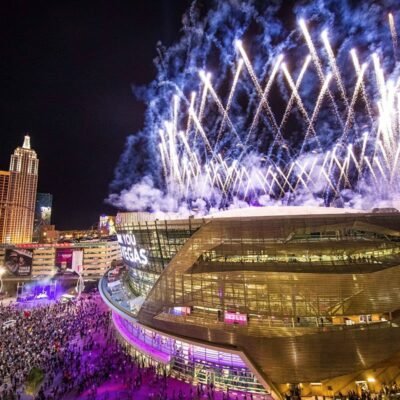
Andrea Ocana’Merida donates blood while her daughter sits quietly beside her at the blood drive hosted by Mercy Air & American Red Cross at Pahrump Valley Fire & Rescue in Pahrump, Nevada on Tuesday, June 4, 2024.
Monday, June 10, 2024 | 2 a.m.
PAHRUMP — Claudia and Ronald Fetcho stopped at Pahrump Valley Fire & Rescue early Tuesday morning to donate blood before running errands.
There’s a shortage of blood in Pahrump — and across the nation — and they wanted to do their part by becoming donors. It was the first time Claudia Fetcho, 72, had donated.
“I saw the ad and I have never given blood before — I’ve always wanted to — but I wasn’t doing anything today so I thought I would come down and give it a shot,” she said. “I have O-positive so I know that (my blood) is in demand; (Ronald Fetcho’s) got A-negative, so this is kind of rare, so we really should give blood.”
Mercy Air, an emergency air medical provider, partnered with the American Red Cross to host the drive. Of the 38 appointment donation slots available, 35 of them were filled, said Tanya Paynter, an account executive at Mercy Air’s parent company, Air Methods. That doesn’t even include some of the walk-ins, like the Fetchos.
Paynter helps organize blood drives and works as a mediator between Mercy Air, the American Red Cross and Pahrump Valley Fire & Rescue. She schedules two blood drives a year in Pahrump, bringing a team of phlebotomists and the necessary medical equipment to a place she says may not otherwise get the opportunity to donate.
Sydney Widdison, a flight nurse for Mercy Air, said the group has two helicopters transferring patients with traumatic injuries from the Desert View Hospital in Pahrump to medical centers in Las Vegas.
The Pahrump community is a busy one for Mercy Air because of how rural it is, said Kimberly Zillgitt, another flight nurse. And the donations in rural towns like Pahrump, officials stress, are paramount to saving lives during emergencies.
“Any time there’s a severe injury (or) trauma type of accident, we do try to administer blood to kind of hold them over to the hospital, so it’s nice to be able to collect donations from the community (and) have a good supply, because there’s very often shortages,” Widdison said. “It is especially important for these blood donations so that we can be prepared and always have blood in our helicopters when we’re in service.”
In January, the American Red Cross declared a national emergency blood shortage, “driven by the lowest number of blood donors in two decades,” the organization said in a news release earlier this year. The American Red Cross explained that critically low levels of blood supplies in the United States “pose a potential threat to patient care.”
Over the past two decades, the Red Cross has seen a 40% decrease in the number of people donating blood. Where there were 3.7 million known donors in 2002, only 2.1 million were recorded in 2022, according to the Red Cross.
The Red Cross supplies about 40% of the country’s blood, so to meet the needs of patients at over 2,500 hospitals and transfusion centers, about 12,500 blood and 3,000 platelet donations must be collected daily, the organization said.
And with an already depleted blood bank, collection disruptions — such as the week between Christmas and New Year’s Day that leads to an almost 7,000-unit shortfall — can “significantly impact blood product availability, potentially leading to dire consequences for patients requiring emergency blood transfusions.” The Red Cross has even had to limit the distribution of type O blood products, considered a universal blood type and the most used in transfusions, to hospitals.
More than 15 hospitals in Southern Nevada alone rely on the Red Cross’ blood supply.
“The only way to obtain transfusable blood is through donations. We rely on the generosity of others to give blood so it’s available when needed,” Dr. Walter Kelley, medical director for the Rocky Mountain Division of the American Red Cross, said in a news release. “Any of us — our friends, family, neighbors — could one day need a transfusion. Yet, in the U.S., where 62% of the population is eligible to give, only about 3% does.”
The Fetchos visit Las Vegas a handful of times a year for medical appointments that they aren’t able to get in their town of just over 44,700 people. It’s about a one-hour drive.
One of the easiest ways for them to access blood drives or other donation events is through these partnership events, where the equipment and phlebotomists can be brought to them. Many of the residents who walked through the fire station’s doors looking to give some of their blood were older residents. Almost 32% of the town’s population is 65 or older, according to a 2022 estimate from the United States Census Bureau.
At any point in time, one of the donors could become a patient strapped into a Mercy Air helicopter and needing a blood transfusion on their way to get treatment at a Las Vegas hospital.
But a nationwide blood supply shortage could affect that.
There are few treatment options for patients with traumatic injuries who are severely bleeding but don’t have access to blood, and transfusing other fluids could possibly exacerbate the issue, Widdison said. Administering blood as soon as possible “can really be the difference between life or death for some of these trauma patients.”
People giving whole blood can donate every 56 days or up to six times a year, according to the American Red Cross.
They must be at least 17 years old in most states, weigh 110 pounds and be in good health and feeling well the day of donation. Those who are anemic, have traveled to a malaria-risk country within the past three years or are sick may be deferred from donating blood for a few months.
The Red Cross said wait times may also apply for people who have recently gotten tattoos or piercings, are taking certain medications or are recovering from a transplant or certain illnesses such as gonorrhea.
The process only took a few minutes for Claudia Fetcho, but it was one she said would be worth doing again so long as she doesn’t need to make the trek into Las Vegas.
“Oh, I definitely would (give blood again),” Fetcho said. “I’m just hoping they need it; I’m sure they’ll use it.”
To search for the nearest American Red Cross donation event, enter your ZIP code on its website: redcross.org/give-blood.html.
grace.darocha@gmg vegas.com / 702-948-7854 / @gracedarocha





